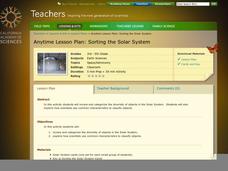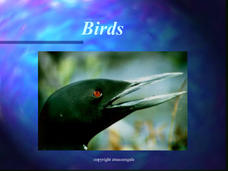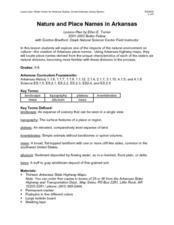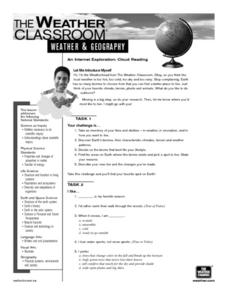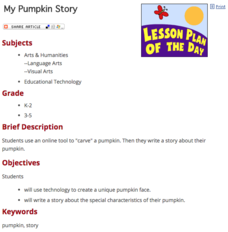Curated OER
Plant Groups
Compare different types of leaves in a science exploration. First, third graders identify common characteristics of various plants, such as daisies, fir needles, and cypress leaves. They then determine if the plants in each group are...
Curated OER
Roman Art, Architecture, and Engineering
There is no better tool to help you explain art or architecture than an image-filled slide show. Classic Greek art, architecture, and engineering are all described with excellent visual examples and text which defines each form by its...
California Academy of Science
Sorting the Solar System
Scientists are always sorting and classifying objects based on their characteristics. In a hands-on learning activity, young space explorers work together to categorize solar system cards based on their properties. It is up to the young...
Virginia Department of Education
Mendelian Genetics
How did Mendel know which pea plants would demonstrate certain characteristics? Pupils explore the answer this question, among others, as they complete Punnet squares, research dominant and recessive traits, and explore hereditary...
Star Wars in the Classroom
Star Wars Geography Unit
What kind of animals live on an ice planet like Hoth? How would the habitat on Tatooine allow different organisms to thrive? Connect social studies, science, and Star Wars in one engaging activity that focuses on the ecosystems of the...
National Institute of Open Schooling
Chemical Bonding
Name is Bond, covalent bond. Through readings and answering questions, classes explore the different types of chemical bonds, their characteristics, valence shell electron pair repulsion theory, and atomic orbitals.
US Institute of Peace
What Does It Take to Be a Peacebuilder?
Is the spirit of peacebuilding already inside you? Scholars take a closer look at the characteristics of peacebuilders, past and present, in lesson plan 13 of a 15-part series. Individuals identify common traits of peacebuilders, then...
Biology Junction
Mollusks
Mollusks created every shell on Earth. Young scientists learn more about the phyllum mollusca in an informative presentation. It covers their characteristics, body plans, and relationships in the ecosystem. Then, it details each class of...
Biology Junction
Birds
Birds adapted to almost every climate on the planet, from the Arctic to the rain forests. A presentation focused on birds covers their similarities and differences. It starts with their evolution from reptiles, their many physical...
Overcoming Obstacles
Creating a Win-Win Situation
As part of a study of ways to resolve conflicts, class members examine the characteristics of win-win solutions and then practice win-win negotiations. They also examine the role of a mediator in conflict resolution and then script and...
Curated OER
Spiders Paso Partners
A series of lessons about spiders is sure to intrigue your elementary arachnologists. It features important background knowledge, seven lessons about the characteristics and life cycles of spiders, and translations in Spanish.
Curated OER
Stream Scanners
Students investigate quality of water in a stream, lake, or pond by examining chemical, physical, and biological characteristics.
Curated OER
Pop Culture Icons: Medieval Music
Kids compare and contrast music from the past to the present. They listen to and review the characteristics of Medieval, Renaissance, Baroque, and Pop music. Then, they discuss the differences in each and how musical icons from the past...
Curated OER
Autism is a World
Explore Autism by watching the CNN presentation: Autism is a World. Upper graders view and discuss the documentary identify the symptoms and characteristics of autism, research treatment options, and create an informational brochure.
Curated OER
Nature and Place Names in Arkansas
Middle schoolers examine the way that many place names in Arkansas came to be. By looking at Arkansas highway maps, they find names that come from the characteristics of each of the state's six geographical divisions. This interesting...
Curated OER
Sorting Things Out
Written to examine seeds that grow in Kansas, you can adapt this instructional activity to anywhere you live. Learners sort a mixture of five different seeds to by any characteristic of their choice. When your budding scientists are...
Curated OER
Student Newspaper Project
Writing teaches us so much. One can identify the many characteristics of a newspaper, use the Internet to gather information, and communicate with others. Primary students create a class newspaper for publishing and dispersal.
Curated OER
F = ma, Inertia, and Action-Reaction
Fourth graders apply concepts of Newton's Laws in scientific inquiries. Use this lesson to have your charges test and identify the characteristics of objects that make them easier or harder to push. After a teacher-led demonstration,...
Curated OER
How Was the White House Designed?
Students examine how the initial design of the White House was chosen. They analyze various designs, explore websites, list the characteristics of each design and compare them, and answer discussion questions.
Curated OER
Fate vs. Mind: A Macedonian Folk Tale
Young scholars read examples of folk tales and describe the characteristics of fables and folk tales. They also examine the concept of fate and if it plays a part in people's lives.
Curated OER
Cloud Reading
Students identify the biomes of the Earth and their characteristics. They discuss their favorite seasons and the weather. They share their favorites with the class.
Education World
My Pumpkin Story
Have young pumpkin carvers use technology to create a unique pumpkin face and write a short story about the special characteristics of their pumpkin.
Curated OER
The Trial of the Bloody Sucker
A blood sucking what? Grade schoolers identify the characteristics of blood sucking parasites. They organize their information, identify their arguments, and present them to the class in persuasive arguments. They participate in a debate...
Curated OER
The Shocking Truth About Fruit
Looking for a great lesson on circuits and conductors of electricity? Take a look at this one! In it, 6th graders create circuits out of pennies, washers, alligator clips, fruit, and LED’s. Learners use voltmeters to analyze the circuits...
Other popular searches
- Characteristics of Fables
- Characteristics of Life
- Fairy Tale Characteristics
- Characteristics of Mammals
- Genre Characteristics
- Characteristics of Folktales
- Characteristics of Animals
- Folktale Characteristics
- Characteristics of Poetry
- Characteristics of Leaves
- Insect Characteristics
- Plant Characteristics




